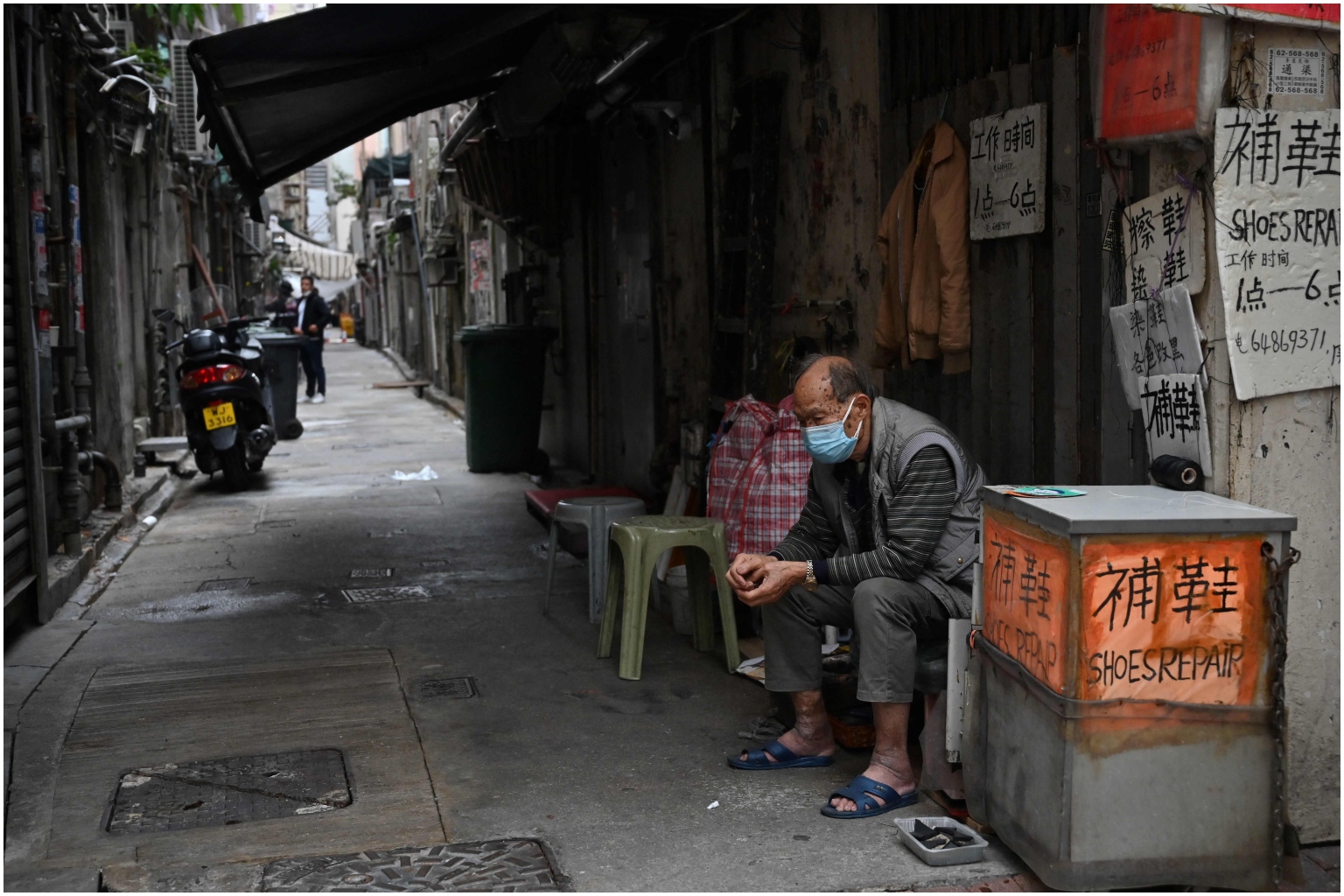Hong Kong could be facing brain drain, but talent will return, says Carrie Lam
Sign up now: Get insights on Asia's fast-moving developments

A man sits down outside a closed down restaurant on a street in Hong Kong on March 29, 2022.
PHOTO: AFP
Follow topic:
HONG KONG - Hong Kong’s leader, who has been under pressure to reopen borders, admitted openly for the first time that the city may be facing a brain drain, capping the government’s anxiety as expatriates continue to make their exits.
But Chief Executive Carrie Lam told the media at a daily briefing on Wednesday (March 30) that she remains “very optimistic” in Hong Kong’s future development.
Mrs Lam, who chaired the session alongside Secretary for Financial Services and the Treasury Christopher Hui, said Hong Kong’s anti-pandemic measures have affected individuals and companies.
In a reference to growing public concerns in the community about a brain drain that includes management executives, she said she believes “that could be the case” although the government does not have specific figures on it.
“But after the pandemic is over, I believe Hong Kong will see positive opportunities,” she said.
“For talents and elite students, we are still very attractive,” added Mrs Lam, who said these people are mobile and can go but can also return.
In a move to assure investors that Hong Kong is stable, Mr Hui said that Hong Kong still functions efficiently as an international financial centre to provide capitalisation and valuation services. He said the city’s financial market does not face any systemic risk despite geopolitical conditions and interest rate hikes.
Noting that the business and commercial sectors had welcomed the “streamlining” of measures announced more than a week ago, Mr Hui stressed that Hong Kong is open to businesses.
From April 1, the existing flight ban on nine places – Australia, Britain, Canada, France, India, Nepal, Pakistan, the Philippines and the United States – will be lifted.
The quarantine period for returning Hong Kong residents who have received two shots of a vaccine will be shortened to seven days in a designated hotel, down from two weeks, in addition to a further seven days of self-monitoring at home.
Many countries have been treating Covid-19 as endemic, but Hong Kong remains one of the cities in the world that requires inbound travellers to serve a compulsory hotel quarantine of up to 14 days.
The tough entry restrictions, part of the city’s zero-Covid-19 policy, is meant to sift out infections and prevent local transmissions by early detection and isolation.
The measures had worked for most part of 2021, when daily living resumed and bars and pubs were open.
But these rules have also isolated the city’s expatriates who find it resource-consuming and costly to visit their families overseas.
Already, there has been a spillover effect in the past three months, with several banks cutting capacity in Hong Kong and building it up elsewhere, particularly in rival Singapore.
In January, Bank of America was reported to have started relocating staff from Hong Kong to Singapore, Citigroup is in the midst of moving half a dozen equities bankers to Singapore and other markets, while some managing directors at JPMorgan Chase made their exits over the past six months, with some moving back to Europe for bigger jobs.
Hong Kong officials’ assurances followed a commentary published in The South China Morning Post a week ago by Mr Liu Guangyuan, China’s Commissioner of the Ministry of Foreign Affairs in Hong Kong.
He urged foreign residents in the city to “understand, support and comply with anti-epidemic measures to safeguard their common home”.
Mr Liu said fighting the epidemic is a priority and Hong Kong is home to many foreign nationals and institutions, so halting the fifth wave and resuming normality as soon as possible is in the best interests of all Hong Kong people, including international residents.
“It is also our shared duty,” he wrote.
Hong Kong, now still battling the fifth wave of pandemic, has had daily infections drop in recent days.
On Wednesday, it added nearly 7,000 cases and 135 deaths.
So far, the city has logged more than 1.13 million infections and over 7,600 deaths.
On Sunday, Financial Secretary Paul Chan warned in his blog that Hong Kong’s economy will shrink in the first quarter of the year, bucking the trend of consecutive growth in the past four quarters.
The first quarter is a turbulent period rocked by almost 7,000 Covid-19 deaths and more unemployment, he wrote.
He added that retail sales figures in February, which have yet to be announced, will fall for the first time in a year, while growth in exports will also weaken.
These are expected as the unemployment rate rose to 4.5 per cent in February, up from 3.9 per cent in January.
Still, Mr Chan said he remained “absolutely confident” in Hong Kong’s economic future.

